ROYALTY AND CHESS
Chess is known as The Royal Game, probably because of the numerous
historical references to Kings playing or patronizing the game.
King Canute
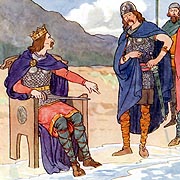
English history records that in 1027 King Canute [son of Sweyn Forkbeard] (995—1035), believed
to be the first English king who played chess, ordered the execution
of the Earl Ulf, following an incident at the chessboard. The Earl
lost his temper because the King took back a move and overturned the
board, an act for which he was condemned to death. Several royal
tempers seem to have been lost over the chessboard.
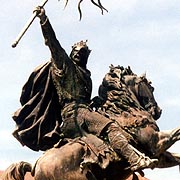 William the Conqueror
William the Conqueror
William the Conqueror (1027—1087) is said to have broken a chessboard over the head
of the Prince of France after losing a game, and his youngest son,
later King Henry I (1068—1135), had some chess pieces thrown in his
face by the French Dauphin, Louis le Gros, after the Dauphin had lost
a game to him.
King John
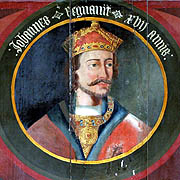
In 1213 King John [John Lackland] insisted on finishing a game of chess before he
would give audience to a messenger bringing news of the siege of
Rouen, and in 1647 King Charles 1 (1600—1649) was playing chess when
the news was brought to him that the Scots had agreed to surrender him
to the English.
Other English monarchs who played chess were
Henry II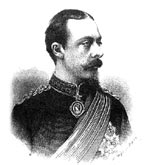 (1133—1189)
(1133—1189)
Richard 1(1157—1199)
Edward I (1239—1307)
Henry VI
(1421—1471)
Elizabeth I (1533—1603)
Charles II (1630—1685)
George
III (1738—1820)
Victoria (1819—1901)
Edward VII (1841—1910)
George V (1865—1936)
Prince Leopold
H. R. H. Prince Leopold, later Duke of Albany, was
President of Oxford University Chess Club in 1875 and used to play
chess with Bird.

Bird
King Knute
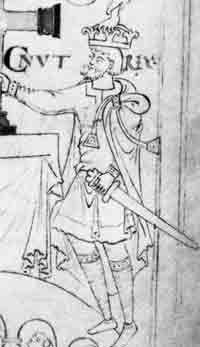 Other European monarchs were just as keen as the English monarchy on
chess. Alfonso the Wise of Spain (1221—1284) was a keen player and
caused a treatise to be written on the game, while another Spanish
King, Philip II (1527—1598), a great lover of the game, had the first
international match played at his court in either 1574 or 1575,
between Spain and Italy. Kings Alfonso VI and X of Castile, John I and
Martin of Aragon, Louis XIII and Louis Philippe of France and Knut V
and Valdemer of Denmark were all keen players. King Knut V was killed
while playing chess with Valdemer, by his enemy King Sweyn. Valdemer
escaped after defending himself by using the chessboard as a shield.
Other European monarchs were just as keen as the English monarchy on
chess. Alfonso the Wise of Spain (1221—1284) was a keen player and
caused a treatise to be written on the game, while another Spanish
King, Philip II (1527—1598), a great lover of the game, had the first
international match played at his court in either 1574 or 1575,
between Spain and Italy. Kings Alfonso VI and X of Castile, John I and
Martin of Aragon, Louis XIII and Louis Philippe of France and Knut V
and Valdemer of Denmark were all keen players. King Knut V was killed
while playing chess with Valdemer, by his enemy King Sweyn. Valdemer
escaped after defending himself by using the chessboard as a shield.
Ivan the Terrible (1530—1584), first Tzar
of Russia, died at the chess board.
The East also produced chess enthusiasts among its heads of state. In 808,
during the siege of Baghdad, the Caliph Al Amoun protested at being
disturbed during a game when the news was brought to him that the city was
in danger of falling. The Mogul conqueror, Timur the Terrible (1336—1405)
was reputed to have been. a strong player, and the Sultan of Turkey, Abdul
Hamid 11(1842—1918) would never allow affairs of state to interfere with
his chess and employed a Hungarian
player as court chess player.
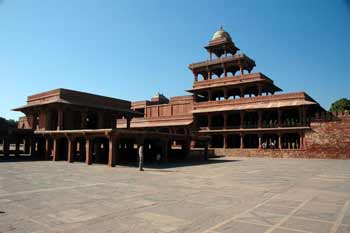
The Pachesi
courtyard Chess garden)of Fatehpur Sikri
The Great Akbar (1542—1605) had a gigantic
board laid out in his palace grounds at Fatehpuri, near Agra, and used
real horses, elephants and camels as pieces; and about 300 years ago Shah
Jehan [builder of the Taj Mahal] built a chess palace at Jehanpore, using
ladies of the harem as pieces and serving boys as Pawns.

